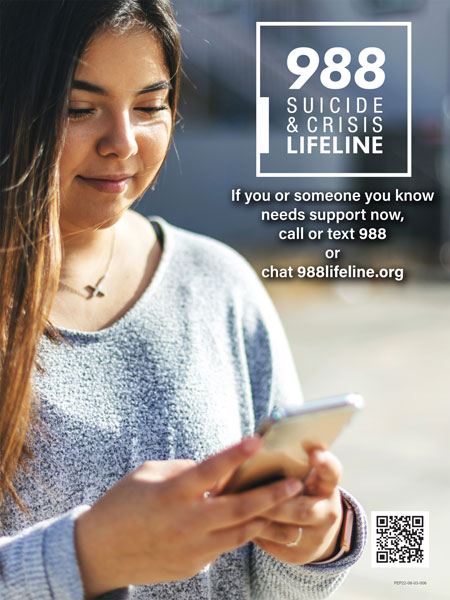By Barb Arland-Fye
The Catholic Messenger
Commit to memory the three-digit code 988, which connects people experiencing mental health-related distress to the existing National Suicide Prevention Lifeline. It complements “911,” the number people recognize instantly to get emergency medical help. The 988 Suicide & Crisis Lifeline — call, text or chat — went live July 16, a much-needed service in the U.S., whose residents continue to struggle with the psychological aftershocks of a persistent pandemic.

This is a poster for the new 988 suicide and crisis lifeline that went into effect July 16.
The state of Iowa anticipates the 988 lifeline will serve 77,056 clients through a two-year federal grant of $932,000. The Catholic Church teaches that access to basic healthcare is the responsibility of all of the faithful and an essential element of the common good. Ongoing funding at the national, state and county level for the 988 lifeline and robust mental health services is essential, mental health advocates and experts say.
Angela Gallagher, executive director of NAMI Greater Mississippi Valley, says, “988 is one part of an emergency response system and that system should be the front door to a complete mental health crisis system. 988 provides a mental health response to an individual or family in crisis. It’s confidential and free.” She underscores the value of the lifeline with this point: “Right now, 90% of calls are worked through with a phone call — people need someone to talk to.”
“If that is not enough,” she says, “people need someone to respond in person to them and so we look to mobile crisis response teams (mental health professionals) to either assist or replace law enforcement, fire and emergency medical professionals. Mobile crisis response is not fully implemented in Iowa, particularly in rural areas. For the 2% to 3% who are chronically ill, we need to provide a place to go — a place to heal.”
For individuals experiencing mental health distress, and their loved ones, it can be daunting to know where to turn. Mental health distress could range from thoughts of suicide to mental health or substance use crisis to any kind of emotional distress. “It’s important that we strive to have local or regional call centers pick up the calls as they have detailed information on where to refer people,” Gallagher said.
In Iowa, two agencies — CommUnity Crisis Services, Iowa City, and Foundation 2 Crisis Services, Cedar Rapids — will handle 988 lifeline calls, chats and texts from people in mental health distress in the state. CommUnity Crisis will take the lead in chats and texts while Foundation 2 Crisis will take the lead on phone calls.
However, the technology allows rerouting of calls so that both agencies can respond in a timely manner. Both agencies have years of experience responding to crisis calls.
A decade ago, Foundation 2 answered about 25,000 calls annually, said Drew Martel, the agency’s director of crisis services. For the fiscal year that ended June 30, the agency answered 70,000 calls. That number could double with the rebranded 988 lifeline.
Martel said his agency is looking to hire additional phone counselors across the state with a minimum of a bachelor’s degree in human services (https://foundation2.org) to meet the demand. CommUniversity is seeking volunteers to assist with its crisis work (http://www.iowacrisischat.org/).
Federal investments for 988 Suicide and Crisis Lifeline increased 18-fold, from $24 million to $432 million, according to the Substance Abuse and Mental Health Services Administration (SAMHSA) of the U.S. Department of Health and Human Services. The money comes from the American Rescue Plan and the Bipartisan Safer Communities Act. President Biden’s Fiscal Year 2022 budget request provides additional funding for the lifeline and for other existing federal crisis funding sources.
In addition to existing public/private sector funding streams, states and federal territories may enact new telecommunications fees to help support 988 operations. The Iowa General Assembly (legis.iowa.gov) reconvenes Jan. 8, 2023. Lawmakers are likely to review a telecommunications tax, like the tax for 911, Gallagher says.
NAMI will keep an eye on that development and advocate for additional insurance coverage for mental health services.
“NAMI state and national organizations will continue to work on advocating for the integration of the call networks behind the scenes and making sure there is enough funding for the anticipated increase in demand on 988, and for mobile crisis and services for the chronically ill,” she said.
Having enough capacity to meet the growing demand for suicide and crisis care needs across the country is the primary focus of its 988 efforts, according to SAMHSA’s website. “This includes strengthening and expanding crisis call center services. It also means improving follow up and linkage to local in-person crisis services and access to community prevention tools and resources, as well as residential and outpatient care.”
“Getting people directed to correct service at the time of the crisis is important,” said Mary Issah, executive director of NAMI Johnson County. “Having staff who have knowledge of navigating the mental health system helps save lives.”
(For more information about the 988 lifeline, visit the website samhsa.gov/findhelp/988/faqs).











